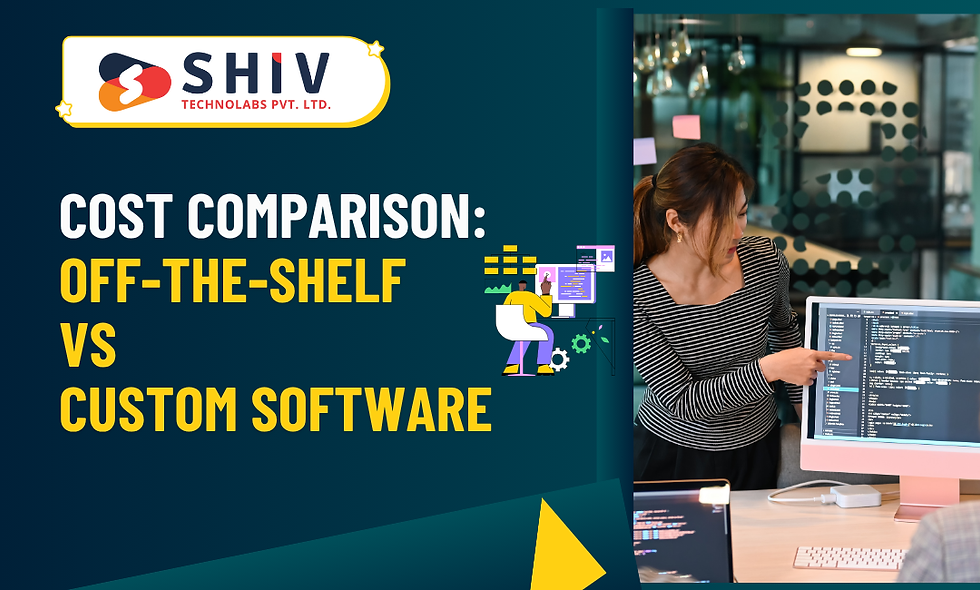Custom Software or Off-the-Shelf: A Clear Business Decision Guide
- Kishan Mehta

- Aug 1, 2025
- 5 min read

Choosing the right software is a big decision for any business. It affects daily operations, team productivity, and customer experience. The two main choices are off-the-shelf software and custom-built software. Each has benefits and limitations.
Many companies start with ready-made tools. They're quick to set up and usually cost less at first. But as needs grow, these tools can create friction, increase manual work, or miss critical features. That’s when businesses start looking at Custom Software Development Services.
This guide breaks down the differences, compares real value, and helps you decide which path fits your business better.
What Is Off-the-Shelf Software?
Off-the-shelf software refers to pre-built applications made for a wide range of users. These are the tools you can purchase, download, or subscribe to directly from vendors.
Examples include:
QuickBooks for accounting
HubSpot for marketing
Trello or Asana for task management
Salesforce for CRM
You can start using them quickly with minimal setup. Most come with fixed features, pricing plans, and support systems.
Benefits of Off-the-Shelf Software
Faster to install and start using
Lower upfront cost
Available support and documentation
Regular updates managed by the vendor
Limitations of Off-the-Shelf Software
Limited flexibility
May not support your unique workflow
Unused features that clutter the interface
Licensing costs grow as the team scales
Limited control over updates or changes
What Is Custom Software?

Custom software is built from scratch—or heavily tailored—for a specific business. It starts with your business logic, internal systems, and goals. Developers write code based on what your users actually need.
Examples include:
Internal dashboards
Custom CRMs for niche industries
Inventory tracking linked to multiple warehouses
Healthcare appointment systems with unique compliance requirements
These tools fit into existing systems and address exact problems. With help from trusted Custom Software Development Services, you get software that grows with you.
Key Decision Factors: What to Consider
Before making a decision, you need to compare both options across a few critical areas.
1. Business Goals and Workflow
Ask yourself: Does your team follow standard processes or need a unique setup?
If your work follows industry norms, off-the-shelf tools might work fine. But if you’re constantly adjusting software to fit your process, that’s a sign you may need something custom. Custom software fits your flow, not the other way around.
2. Budget and Total Cost Over Time
Off-the-shelf tools often look cheaper in the beginning. But costs build over time.
You pay monthly or yearly fees. You might also need to subscribe to multiple tools to cover gaps. These recurring costs grow with team size.
Custom software has a higher upfront cost but minimal recurring fees. You build once, use for years, and upgrade when needed. You avoid license hikes, usage limits, and third-party add-ons.
3. Feature Fit and Performance
Ready-made tools try to serve thousands of businesses at once. This leads to:
Features you don’t need
Missing features you do need
A cluttered interface
Custom software only includes features that support your work. This makes the interface faster, cleaner, and easier for teams to adopt.
You also reduce time spent on workarounds, double data entry, or switching between apps.
4. Security and Compliance
For industries like finance, healthcare, or government, data handling is critical.
Off-the-shelf tools follow general standards, but you may not know where your data is stored or who accesses it.
Custom software gives full control. You decide how data is stored, processed, and accessed. This helps meet industry-specific rules and avoid third-party risks.
5. Integration With Other Tools
Businesses often run multiple systems: HR, finance, support, logistics, etc. These systems need to share data.
Most off-the-shelf tools offer limited integrations. Some require extra fees or third-party platforms to connect.
Custom software can be built to connect directly with your current tools. This means real-time data flow and fewer manual tasks.
6. Scalability
Business needs change over time. You may:
Add more staff
Expand into new regions
Offer new services
Serve more customers
Off-the-shelf tools can limit growth. Some cap users, slow down with heavy data, or charge more for extra features. Custom software allows you to scale as you grow. You can add new modules, support more users, and adjust features without switching platforms.
7. Team Adoption and Productivity
When tools don’t match how people work, they avoid using them. This leads to low productivity and wasted investment. Custom software matches how your teams already operate. It improves speed, reduces confusion, and makes training easier. Adoption becomes natural, not forced.
Cost Comparison: Off-the-Shelf vs Custom Software

Here’s a simple side-by-side to understand true cost and value:
Factor | Off-the-Shelf Software | Custom Software |
Upfront Cost | Low | Medium to High |
Monthly/Yearly Fees | Ongoing | None or minimal support cost |
Custom Fit | Limited | Built for your workflow |
Integration | May require add-ons | Direct, built-in |
Control Over Updates | None | Full control |
Data Ownership | Shared with vendor | Fully owned |
Long-Term ROI | Moderate | High (3–5 year window) |
Use Cases: Which Option Works Best When?
Use Off-the-Shelf Software When:
You need a fast launch
Budget is limited
Team size is small
You’re testing an idea or MVP
Workflows are standard
Use Custom Software When:
Your workflow is unique
You plan to grow fast
Data control is a concern
Multiple teams need integration
Off-the-shelf tools are limiting your progress
Real Business Scenarios
Retail Chain
Starts with Shopify and Google Sheets. As they scale, stock tracking becomes a mess. They move to a custom inventory system connected with their POS and supplier database. Result: fewer stockouts and faster restocking.
Logistics Firm
Relies on Excel and email to manage shipments. Custom software helps automate booking, tracking, and client updates. They cut manual work by 60%.
Healthcare Provider
Off-the-shelf tools can’t meet HIPAA standards. A custom platform gives full control over data, role access, and appointment scheduling.
The Role of a Development Partner
Custom software isn’t a solo journey. You’ll need a partner who listens, builds, tests, and supports your goals. The right team will understand your needs and shape your system accordingly.
Making the Final Call: A Checklist
Use this quick checklist to decide which type fits your business best:
Does your current software fit all your workflows?
Do you find yourself using workarounds or manual fixes?
Do you rely on multiple tools to complete one task?
Are you scaling quickly or entering new markets?
Is compliance and data control a top priority?
Do you plan to reduce licensing costs over time?
If most answers are “yes,” custom software may serve you better in the long run.
Why Choose Shiv Technolabs for Custom Software Development Services ?
Shiv Technolabs offers custom software development services that align with your business structure, workflow, and long-term goals. Our team works closely with you to understand your technical requirements and builds solutions that improve efficiency, data flow, and system performance. Whether you need a custom CRM, ERP, or a fully integrated platform, we help you build tools that support your operations from the ground up.
If you're planning to move away from off-the-shelf tools and want software tailored to your business, Shiv Technolabs is ready to support your next step.
Contact us to discuss your project requirements, ask questions, or schedule a consultation with our development team.
Conclusion
Choosing between off-the-shelf and custom software depends on how well the solution supports your technical needs, integrations, and growth plans. Off-the-shelf tools offer quick access but come with fixed features, limited control, and recurring costs.
Custom software allows full ownership of the codebase, flexible architecture, and system-level integrations tailored to your infrastructure. It supports scalability, better data flow across departments, and long-term efficiency. Businesses with evolving workflows, strict security needs, or complex operations often benefit more from a custom-built system designed to match their technical environment.



Comments